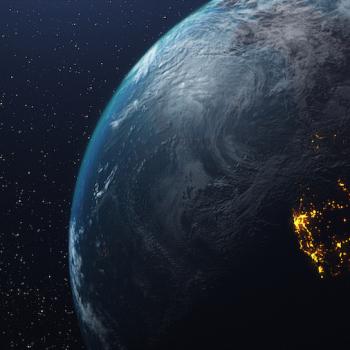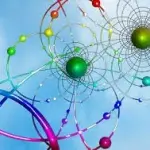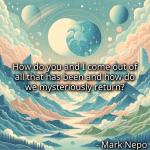 I’m surprised that humans didn’t discover something like Darwinian evolution from observing human behavior. Metaphors comparing human behavior with the behavior of other animals date back to early times. Our sexuality is goatish, we eat like pigs, we lock horns in battle, we strive to be top dog, to provide a few examples.
I’m surprised that humans didn’t discover something like Darwinian evolution from observing human behavior. Metaphors comparing human behavior with the behavior of other animals date back to early times. Our sexuality is goatish, we eat like pigs, we lock horns in battle, we strive to be top dog, to provide a few examples.
Such metaphors show that humans have long been aware that we share traits with other animals. It shouldn’t have been too hard, at least for those who could think outside of religiously sanctioned categories, to imagine that we had these traits of other animals, because we shared a similarity to them. And we shared that similarity because we had evolved from them.
Not only in metaphors, but in myths there is a recognition that there is something a bit beast-like in our behavior. The so-called Orphic Myth, in particular, shows recognition of this. To quote the Wikipedia:
According to this myth, the infant Dionysus is killed, torn apart, and consumed by the Titans. In retribution, Zeus strikes the Titans with a thunderbolt, turning them to ash. From these ashes, humanity is born. In Orphic belief, this myth describes humanity as having a dual nature: body, inherited from the Titans, and a divine spark of soul, inherited from Dionysus.
This myth shows that humans have long recognized that as bodily beings we are earthy and animalistic. But it also suggests why deriving a theory of evolution from observing human behavior might have been unlikely.
The theory of evolution gives a clear explanation for the more animal-like aspects of the human, but does not explain why we also have something of “a divine nature.” As an example, what I’d call hard-core evolutionists always have to deny the possibility of human altruism because such altruism doesn’t fit into the scheme of biological evolution. Such things as altruism probably do not belong to our biological nature, but do exist as cultural ideals. This “divine part” of our nature is the part that strives to live up to cultural ideals and cultural values such as truth, beauty and goodness.
In biological evolution, there is a single principle that determines if a genetic mutation is “noise” or if it is genetic “information.” This is survival. If a mutation furthers survival, it is preserved as genetic information available to future offspring. If not, it is noise and not passed on. The biosphere is a grand repository of information about successful survival strategies. Each extant species (and the extinct ones also) represents a complex survival strategy.
Cultural evolution, it would seem, has no such simple principle underlying it. Survival plays a role, but survival cannot explain the long history of fashion in clothing, ornamentation in design, and really nothing of why the various arts are held in such high esteem, to name a few items. Nor can survival alone explain the rise of and proliferation of modern science.
I’ve read many attempts to explain such things on the basis of biological evolution, but none of these attempts are convincing. The simple fact is that biology alone does not explain human behavior. It is an amalgam of biological and cultural elements. And as it stands, there is no generally accepted theory of cultural evolution.
* * * * * *
Observing my own behavior and the various impulses and appetites that motivate it, I’ve come to see that my motivation at base is largely biological. I am motivated by a handful of urges and drives. I suspect that I am not very different from other people in this regard.
These urges include drives toward nourishment, security, reproduction, power and status. The first four of these we share with early forms of animal life, such as reptiles. The last we share with many kinds of social animals, particularly canines and primates.
While I suggest that all motivation at base is biological, human cultures have developed elaborate cultural forms, cultural clothing we might say, to cover these naked motivations.
Thus, while all humans are driven to eat, different cultures dictate what, when and with whom it is proper to eat. Modern western culture is quite lax in regard to eating, but many cultures still have quite strict expectations.
As with our need for nutrition, so with our drive to reproduce. I expect the reader is familiar with the strict cultural demands about when, with whom, and under what conditions people are to engage in sexual intercourse, so I won’t add examples.
With our urge toward power and status, however, things get more complicated. The topic is too complicated to address here, but I’ll mention that the belief that through the mechanism of free markets, private vices can lead to public good, is still widely held. The private vices that drive capitalism include the primitive urges for power, security and status.
And so with all of our drives. Cultural forms camouflage the biological origins of our drives and channel our basic motivations into ends that the culture deems appropriate.
* * * * * *
Exploring human behavior through the lens of Darwinian evolution provides important insights into human behavior. Some of these are obvious, such as why when a being whose bodily appetites were shaped in an environment of nutritional scarcity is placed in an environment of nutritional overabundance, obesity is the likely outcome.
But some are more subtle. I think the role of religion is such a case. Religion has played a central role in virtually all cultures. The notion of our dual nature, such as the Orphic myth portrays, has something to do with it.
Rather than a Titanic body and divine soul, if we consider this dual nature as one part biology shaped by Darwinian evolution and one part nurture, shaped by cultural evolution, one of religion’s central roles emerges. That is to promote and strengthen the cultural part of our behavior and repress or redirect the biological. As sexuality is the most overt and unwieldy part of our biological nature, it is not surprising that many religions emphasize strong prohibitions on sexuality.
In the Christian tradition in which I was raised, we were taught that there are devils that tempt us to do bad and angels that pull us toward the good. In the terms I’m developing here, bad is equivalent to identifying with our biological drives, and good is to redirect our motivations toward ends acceptable to our cultural ideals.
We are naturally inclined to follow our urges, but have to make an effort to ascend toward cultural ideals. Religion has, as one of its roles, that of educating people on these ideals and the kind of effort required to achieve them.
* * * * * *
Adherents of Naturalism, such as myself, tend to prefer explanations of the physical sciences over those of the humanities and social sciences. But we need to recognize that human culture is also a part of Nature. Nature is creational, and culture is an incredible extension of Nature’s creativity.
Prior to the emergence of the biological, Nature created such things as spiral galaxies and crystals. With the emergence of biology, Nature created such things as the octopus, redwood trees and wildebeests. With the emergence of culture, Nature, through its human agents, created and continues to create such things as the Parthenon, the jumbo jet, the cell phone and millions of other novel things.
Culture is not over and against Nature, but an extension of it. The basic dualism of Western culture, which shows up in the Orphic myth, obscures this fact. But naturalism, and particularly spiritual naturalism, needs to recognize this fact in order to achieve a greater understanding and appreciation of Nature’s incredible creativity.
__________
















